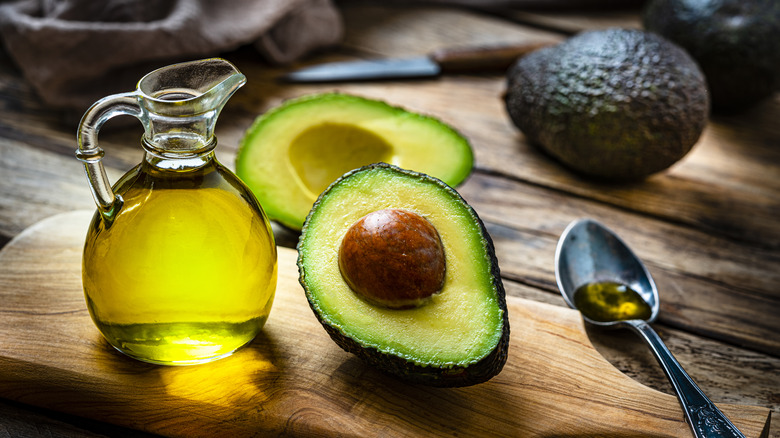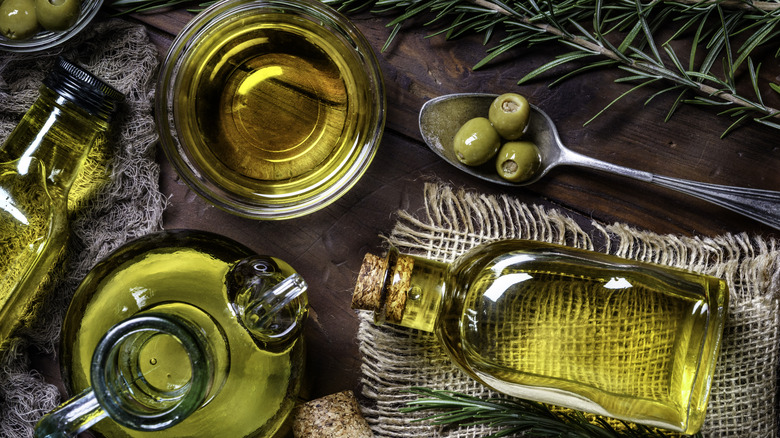Bobby Flay's Simple Oil Swap For Better Pasta Sauce
Celebrity chef, Iron Chef extraordinaire, and cookbook author Bobby Flay is no stranger to a culinary challenge. But beyond his tendency to engage in cook-offs, Flay has a few tricks up his sleeve when it comes to cooking. Flay shared some of his cooking tips at a Food & Wine event in Aspen, Colorado. During his presentation, Flay revealed a few secrets to making the perfect pasta sauce, and you might want to put down your olive oil for this trick.
Yes, that's right: Bobby Flay skips the olive oil when preparing his pasta sauce. Instead, the celebrity chef uses avocado oil when sauteing the aromatic base of his sauce. This might seem like an odd choice for a traditional Italian dish.
However, Flay has some pretty good reasoning behind his oil of choice. For starters, avocado oil has a higher smoke point than olive oil and can be cooked at a heat as high as around 520 degrees Fahrenheit without burning. Additionally, avocado oil provides an excellent base for sauce, as it has a more neutral flavor. This allows your sauce's flavors to shine through without risking burnt oil or an overpowering taste. Of course, this doesn't mean you have to set your olive oil aside completely. Instead, you can use it as a final flourish to your recipe, adding richness and a stronger flavor to your pasta sauce.
Why you should go for avocado
Avocado oil is great for sauteing ingredients thanks to its high smoke point. In addition, avocado oil also has a neutral flavor, which ensures that it won't overpower the flavors of other ingredients. But beyond being a great flavor choice, avocado oil is also a great choice for health. This is because avocado oil is rich in monounsaturated fats, which are a more health-healthy choice than saturated fats when cooking. Avocado oil is also rich in unsaturated fatty acids, which can also be beneficial to heart health and could potentially help reduce cholesterol.
But of course, avocado oil is just one of the increasingly large rotation of cooking oils that have come to challenge the once ubiquitous olive oil while cooking. Other oils, such as grapeseed oil and sunflower oil, have become more popular in recent years. And though olive oil will always have a place on the kitchen counter, knowing when to use an alternative oil is a vitally important skill when navigating the kitchen. And avocado oil can be a fantastic stand-in for olive oil, especially in high-heat situations.
When to use olive oil
However, this doesn't mean that Bobby Flay is suggesting you ditch olive oil entirely, especially when making a luscious pasta sauce. Instead, Flay suggests adding your olive oil at the end of the cooking process, drizzling it over your sauce to add richness in both flavor and texture. A good olive oil doesn't have to be added during the saute process — it can be the perfect finishing touch to your dish. It's also important to avoid adding olive oil to your pasta water, as it can prevent your sauce from sticking to your pasta and really doesn't add the same punch of flavor as adding your olive oil directly to pasta sauce will.
But you won't want to add just any olive oil as a flourish. You should go for a truly high-quality olive oil. For starters, you will want to make sure that your oil has an extra-virgin olive oil seal on the bottle. This indicates that your olive oil truly is extra-virgin, which means that it is unrefined and cold-pressed, producing the highest quality oil. If your olive oil is from Europe — or elsewhere outside of the U.S. – you should look for a certification from the International Oil Council (IOC). And if your oil is from the U.S., look for the California Oil Council seal. Doing so will ensure that you are getting the best, most flavorful oil.


